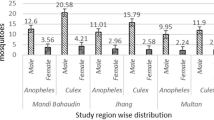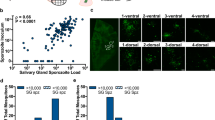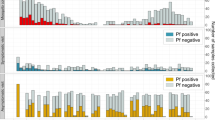Abstract
DURING some experimental work carried out on the cytology of early oocysts of Plasmodium cynomolgi in Anopheles stephensi an interesting observation was made. Three batches of laboratory-bred Anopheles stephensi were fed on a rhesus monkey (M. 172) infected with P. cynomolgi. Dissections of 4–10 mosquitoes on each subsequent day showed that the first and third batches of these mosquitoes were also infected with a microsporidian (Plistophora culicis). (Such infections have previously been described by Garnham1 and Canning2.) Nearly 50 per cent of the dissected mosquitoes showed a moderate infection of P. culicis in the first batch, a light infection of about 5 per cent in the second batch, and approximately 100 per cent with heavy infections of P. culicis in the third batch. A poor rate of infection by P. cynomolgi was found in the first and third batches of A. stephensi, and this was considered due to the partial inhibitory influence of P. culicis on the development of the oocysts in these mosquitoes. This view was supported by the findings of good oocysts counts in the mosquitoes dissected from batch two in which the P. culicis infections were very light.
Similar content being viewed by others
Article PDF
References
Garnham, P. C. C., Bull. World Health Org. Geneva, 15, Nos. 3, 4, 5 845 (1956).
Canning, E. U., Rivista di Malariologia, 36, Nos. 1–3 (1957).
Author information
Authors and Affiliations
Rights and permissions
About this article
Cite this article
BANO, L. Partial Inhibitory Effect of Plistophora culicis on the Sporogonic Cycle of Plasmodium cynomolgi in Anopheles Stephensi . Nature 181, 430 (1958). https://doi.org/10.1038/181430a0
Issue date:
DOI: https://doi.org/10.1038/181430a0
This article is cited by
-
Larval predation in malaria vectors and its potential implication in malaria transmission: an overlooked ecosystem service?
Parasites & Vectors (2019)
-
The effect of nosematosis on the development ofPlasmodium falciparum inAnopheles stephensi
Parasitology Research (1992)
-
The effects ofNosema algerae on the development ofPlasmodium yoelii nigeriensis inAnopheles stephensi
Parasitology Research (1992)



